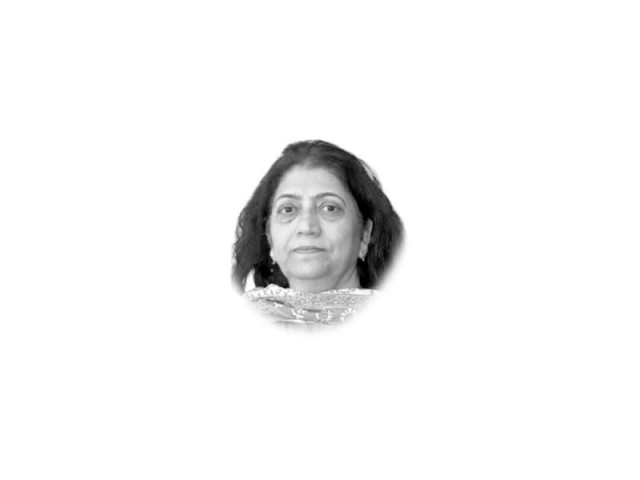The teachers we need for the society we want
Recent floods in Sindh, other parts of Pakistan serve as reminder that we often lack genuine concern for common good

The Unesco theme for World Teachers’ Day 2023 is “The Teachers We Need for the Education We Want”. I believe it is important to expand this to “The Teachers We Need for the Society We Want.”
Education is deeply intertwined with society, which shapes the values, norms and needs of its members. Education should be tailored to meet these specific needs and challenges. Without understanding societal context, education may become disconnected from the real-life experiences and requirements of individuals, leading to a lack of relevance.
In this era of consumerism, where material development is often the primary measure of success, it is important to remember that true happiness comes from more than just material possessions. Why is Costa Rica among the top three happiest countries in the world? Researchers have identified renewable resources, a clean environment, strong social bonds and investment in education as the primary sources of happiness there.
The recent floods in Sindh and other parts of Pakistan serve as a reminder that we often lack genuine concern for the common good. The many crises facing the world today, such as climate change, international terrorism and intolerance, are the result of people’s tendency to prioritise short-term goals over sustainable long-term goals.
The next generation of people needs to be sensitive to the common good, natural resources, languages, culture and values. They need to learn about the ripple effects of both just and unjust acts. Martin Luther King Jr said, “Injustice anywhere is a threat to justice everywhere.”
Therefore, it is important to build community before we discuss building society. This requires breaking down alienation and cherishing connectedness and collaboration, which are essential tenets of global communities.
Another important dimension is that students today are skeptical of societal norms, values and practices. They should have opportunities to critique and question these norms and to be part of the co-creation of knowledge, reinventing ways of doing things differently and setting new norms and traditions.
We have already experienced, particularly during the pandemic, that learning spaces are no longer confined to the four walls of a classroom. Learning can happen anywhere, from real and virtual classrooms to communities, public spaces, organisations, and academic and professional learning communities. The future society may well embrace experiential learning.
In a nutshell, a reasonable command over the subject matter remains essential. However, with the rapid pace of knowledge construction in almost all fields, this command must be accompanied by curiosity and critical thinking. There will be no shortage of data and information, but we will need the capacity to sift through it, critique it and put it to socially beneficial uses. It is essential that teacher education programmes develop this capacity in teachers.
A good blend of a broad knowledge base, transferable skills and a strong sense of social justice would help individuals to fulfil their personal goals and contribute well to the social and economic development of the community they live in.
The unbridled pursuit of individualism and excessive competition underpins many of our social problems and above all rusts the pursuit of the common good. The next generation of teachers must recognise the importance of languages, culture, human values and collective ownership and responsible consumption of natural resources. Therefore, empathy and a just mindset are essential.
Renewable resources (Kumar, 2020), a clean environment (Liu, 2022), and strong social bonds (Gable, 2018) are key to flourishing at collective and individual levels.
The increasing recognition of physical and neuro diversity as well as the importance of divergent ways of thinking and living call for pedagogies that seek inclusivity and equal opportunities for all. Commitment to these values ought to be central to any teacher education programme. Here, comfort with the use of technology and an ability to make critical and informed decisions about its deployment are inescapable components of any teacher preparation programme.
Education in its very nature is futuristic, as a new teacher today will continue to serve for approximately 25-30 years. If the last three decades are any guide, this means that the teacher’s career will see extraordinary changes in educational settings, technology, human geography and environmental conditions, all shaping teaching-learning processes in ways we cannot fully imagine. This means that any preparatory programme for teachers must educate them, to the extent possible, with the mindset, approaches to knowledge and moral reasoning capable of helping them navigate these changes.
In a country facing crushing poverty interwoven with social inequalities, education which does not contribute to economic and social development is merely a luxury. I found this quote, while quite dated, to be particularly applicable to our context: “to be liberally educated and to be prepared to teach are equivalent” (Borrowman, 1965, p. 1).
We need teachers who can help us build the society we want, one that is empathetic, just and sustainable. In short, we need teachers who can help us create a better world.
Published in The Express Tribune, January 14th, 2024.
Like Opinion & Editorial on Facebook, follow @ETOpEd on Twitter to receive all updates on all our daily pieces.















COMMENTS
Comments are moderated and generally will be posted if they are on-topic and not abusive.
For more information, please see our Comments FAQ